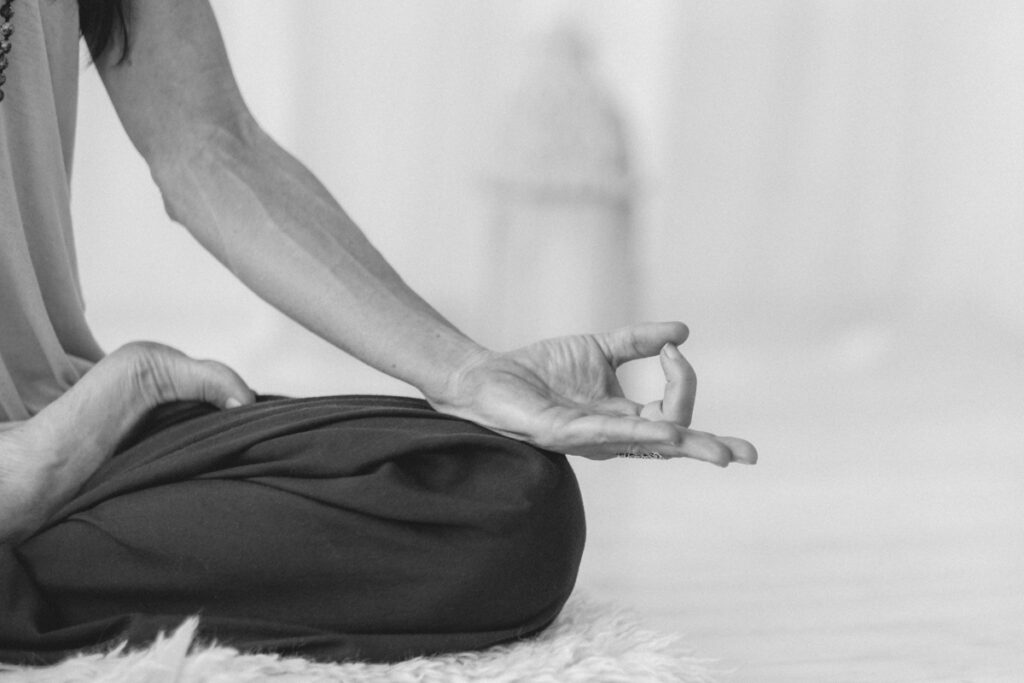
Mantras have been used for spiritual growth and inner peace for thousands of years.
Mantra
A mantra is a sacred sound, word, or phrase with a powerful vibration capable of transforming the mind and spirit. The word "mantra" comes from the Sanskrit words "man," meaning mind, and "tra," meaning instrument or tool. A mantra is an instrument for focusing and calming the mind, allowing us to go beyond our thoughts and connect with a higher consciousness. Mantras can be simple sounds or complex phrases, and when repeated with intention, they can clear the mind, center the soul, and open pathways to spiritual awakening.
Chanting
Chanting, the practice of repeating a mantra aloud, is one of the most common ways to engage with these sacred sounds. The repetition of a mantra through chanting is not only a mental exercise but also a deeply spiritual practice. As we chant, the vibrations of the mantra ripple through our body, shifting our energy and helping us to release mental clutter. The chanting rhythm has a calming effect, bringing our awareness to the present moment and creating a deep connection. It is a form of meditation in motion, where the voice, breath, and mind align, creating a space of stillness and peace.
Kirtan
Kirtan is a specific chanting form often performed in a group setting. It is a call-and-response style of chanting that originated in ancient India and is still widely practiced today. In a kirtan, a leader sings a mantra or sacred phrase, and the rest of the group responds in union. This back-and-forth exchange creates a dynamic and interactive energy, allowing the participants to feel a deep sense of communion with each other and the divine. Kirtan is usually accompanied by instruments, such as drums, tambourines, and harmoniums, which enhance the rhythm and create a joyful, uplifting atmosphere. The instruments and the participants' voices amplify the sound and help create an energetic field that can be felt on a deep, physical level.
The practice of kirtan is more than just singing—it is a celebration of the divine energy within and around us. We release our egos and surrender to the shared experience through collective chanting. Kirtan opens up a space for emotional healing, spiritual awakening, and a deeper connection to the universe and each other. As we chant together, we tap into the power of sound and vibration, experiencing a sense of unity and love that transcends words.
Singing mantras around a bonfire adds more magic to the practice. The fire symbolizes transformation, purification, and illumination. As the flames dance and crackle, the mantras' energy merges with the fire's warmth and light, creating an experience that is both grounding and expansive. The combination of the chanting and the natural elements offers a unique opportunity to connect profoundly with nature, the universe, and the spirit. The circle of people gathered around the fire, singing together, creates a sense of community and shared intention, amplifying the healing and transformative power of the mantra.
In the end, the power of the mantra lies in its simplicity and ability to bring us back to our true selves. Whether new to chanting or have been practicing for years, singing mantras in a group creates a sacred space where transformation can occur. Through kirtan and the collective power of sound, we are reminded of our interconnectedness and our shared journey toward peace, love, and harmony. The mantra's vibrations, the chant's rhythm, and the group's unity offer a beautiful opportunity to experience inner peace and deep connection.
6 Powerful Mantras:
Om
The most universal mantra, Om, is the sound of the universe, representing the connection between all living beings. Chanting Om can help you align with the flow of universal energy and find inner peace.
Om Mani Padme Hum
This Tibetan mantra, "The jewel is in the lotus," is associated with compassion and heart healing. It invites love, kindness, and balance into your life.
So Hum
Translated to "I am that," this mantra reminds you of your oneness with the universe. It helps you connect with your true nature and creates unity and harmony.
Gayatri Mantra
The Gayatri mantra is a prayer for wisdom and enlightenment. It calls upon the divine light to illuminate the mind and lead us on the path of truth and knowledge.
Lokah Samastah Sukhino Bhavantu
This mantra translates to "May all beings be happy and free." It is a beautiful invocation of peace and good wishes for the well-being of all, helping to cultivate love and compassion for yourself and others.
Om Namah Shiva
This mantra honors Lord Shiva, the destroyer of ignorance and ego. Chanting "Om Namah Shivaya" invokes transformative energy, helping to remove obstacles, purify the mind, and bring spiritual growth.
Here, you can read my blog post about "Namaste."
Join us for a Kirtan Bonfire in Moldemarka 30. March at 16:00!
Let's come together to enjoy the warmth of the fire, the power of chanting, and the peaceful energy of nature. All are welcome to share this special moment of connection and joy.
Registrations: send email to: mittpille@gmail.com
Bli med på Kirtan Bonfire i Moldemarka 30. mars, kl. 16:00!
La oss samles for å nyte varmen fra bålet, kraften i chanting og den fredfulle energien fra naturen. Alle er velkomne til å dele dette spesielle øyeblikket av samhold og glede.
Meld deg på email: mittpille@gmail.com
Savasana, or Shavasana, is the Sanskrit name for an essential restorative asana. It is a key component of asana practice in almost every yoga tradition. It is most commonly used at the end of a sequence for relaxation and integration. However, it is also powerful as a stand-alone exercise to restore balance and combat stress. Some schools also use it to calm the body and mind at the start of a class and to learn and practice yogic breathing. In Yin Yoga, Restorative Yoga, Sivananda yoga class, and Yoga Therapy, Shavasana is sometimes practiced between postures to calm the nervous system.
The term is derived from two Sanskrit roots: shava, meaning "corpse," and asana, meaning "seat" or "posture." The first written record of savasana is found in a classic 15th-century yoga text, Hatha Yoga Pradipika, which says: “Lying down on the ground, like a corpse, is called savasana. It removes fatigue and gives rest to the mind”.



The Symbolism of Shavasana
In yoga philosophy, Shavasana represents a symbolic death. By letting go of physical and mental tension, practitioners "shed" their old selves and emerge renewed, much like a rebirth. It is an opportunity to release the ego and experience the interconnectedness of mind, body, and spirit. Shavasana is a profound surrender of the present moment, letting yourself be and meditating on that.
Scientific Perspective
Modern research supports the benefits of Shavasana, particularly in stress management. Studies show that practicing Shavasana can lower blood pressure, reduce heart rate, and decrease stress hormones like adrenaline and cortisol. It is also used in therapeutic settings to manage conditions such as anxiety, depression, and chronic pain.
Shavasana, or Corpse Pose, is a highly effective tool for activating the parasympathetic nervous system (PNS). This activation is critical in balancing the body and mind, especially in today’s fast-paced, stress-driven world.
The parasympathetic nervous system (PNS), often called the "rest-and-digest" system, plays a vital role in the body’s ability to heal. When the PNS is activated, it shifts the body out of the "fight-or-flight" mode dominated by the sympathetic nervous system (SNS) and into a state of relaxation and recovery. This activation lets the body focus on repair, restoration, and overall well-being.
How to practice Shavasana
Set Up Your Space: Choose a quiet and comfortable area. Use a yoga mat or a blanket for cushioning. Place a small pillow under your head or knees to ease neck or lower back tension.
Lie Down Comfortably:
- Lie flat on your back with your arms extended slightly away from your body.
- Palms should face upward, fingers naturally curling.
- Legs are straight, and feet fall naturally to the sides. If you feel discomfort in your lower back, place a bolster or rolled blanket under your knees.
Align Your Body:
- Ensure your spine is in a neutral position.
- Adjust your head so your neck feels lengthened, and avoid straining to either side.
Close Your Eyes and Breathe:
- Allow your eyes to close gently and your facial muscles to relax.
- Breathe naturally, noticing the flow of air without trying to control it.
Relax Every Part of Your Body:
- Mentally scan your body from head to toe, releasing any tension you may be holding.
- Start with your face, jaw, and shoulders, and gradually move down to your fingers, abdomen, legs, and toes.
Be Present:
- Focus on the sensations in your body, the rhythm of your breath, or simply the feeling of stillness.
- If your mind starts to wander, gently guide it back to your breath or physical sensations.
Stay Still:
- Remain in Shavasana for 5–15 minutes, depending on your schedule and needs.
- When you're ready to come out, deepen your breath, wiggle your fingers and toes, and roll onto one side before slowly sitting up.

Benefits of Shavasana
Physical Relaxation:
- Shavasana helps release muscular tension and allows the body to recover from physical exertion. This is why it is often practiced at the end of a yoga session.
Mental Clarity and Stress Relief:
- Shavasana calms the nervous system, reduces cortisol levels, and relieves mental fatigue by practicing conscious relaxation. Chronic stress impairs immune function, increases inflammation, and slows healing. By reducing stress hormones, the PNS creates a more favorable environment for healing.
Improved Concentration:
- Regular practice enhances mindfulness and concentration, making it easier to focus during daily tasks.
Enhanced Self-Awareness:
- Shavasana allows you to connect with your inner self, fostering greater self-awareness and emotional balance. Mind-body awareness helps individuals listen to their body’s needs, make healthier choices, and actively participate in their healing process.
Better Sleep:
- The deep relaxation experienced in Shavasana can improve sleep quality by helping to reset the body's stress response. Sleep is critical for healing because it’s when the body focuses on cellular repair, hormone regulation, and immune function.
Supports Healing:
- It activates the parasympathetic nervous system (rest-and-digest mode), promoting healing and restoring the body's natural balance. Chronic stress impairs immune function, increases inflammation, and slows healing. By reducing stress hormones, the PNS creates a more favorable environment for healing.
Though it may appear simple, Shavasana is a profound and transformative practice. It teaches us the art of relaxation, letting us let go of physical and mental burdens and connect to a more profound sense of peace. Whether you are a seasoned yogi or a beginner, embracing Shavasana can bring balance, clarity, and a sense of renewal. So, the next time you step onto your mat, remember that the stillness of Shavasana is just as valuable as the movement in any other pose.
In 2016, I decided to participate in a winter yoga retreat that unknowingly shaped my life most profoundly. It was my 50th birthday, and I lived alone in a rental apartment in Molde, Norway. I had recently broken up with my boyfriend and was still nursing a broken heart, feeling the weight of loneliness far away from my family and friends. However, healthy and independent, I yearned for a more profound sense of fulfillment and healing. I knew I wanted to celebrate this milestone by doing something meaningful, something I’d always dreamed of. And that’s when the idea of a winter escape, a mix of skiing and yoga, crept into my mind.
I’ve always loved the snow. Skiing and snowboarding have been my favorite winter activities, though they were mostly out of reach for me financially, so I’d usually enjoy winter locally. But for my 50th birthday, I was determined to give myself the experience I’d always wanted. So, I started Googling “ski and yoga” and found a retreat in France. I didn't even know what the word retreat meant. You can click here to read more about the meaning of modern retreat.
It looked magical: yoga, skiing, snowboarding, healthy food, community, and the beauty of winter all woven together. But when I saw the price, my heart sank a little. At that time, investing in a retreat was a big stretch. Yet, something deep inside urged me to leap. I started saving, giving up a few small comforts here and there, and eventually, I booked my spot in a shared room.
Despite the excitement, I was nervous. Going on this adventure alone felt daunting, and I couldn’t help but wonder if I’d made the right decision. Besides, I was struggling with back pain at the time, and the thought of keeping up with a yoga practice in the mountains was intimidating. But I reminded myself that this was a gift to myself—a chance to try something new and maybe even learn something I could carry forward. And so, I set off to France, hopeful and a little scared.

The Life-Changing Moments of My First Yoga Retreat
The moment I arrived, I knew the trip would be something special. I was welcomed by the crisp mountain air, towering snow-capped peaks, and a group of like-minded souls who shared my love for winter and my passion for yoga. We started each day with yoga in front of the fireplace, moving our bodies in ways that soothed the aches, awakened muscles I’d long forgotten, and brought an incredible sense of calm.
Days were filled with skiing and snowboarding, and my love for winter sports felt renewed. With each downhill glide, I felt the worries of everyday life fade away. The joy, the freedom, the laughter—everything I’d longed for and more.
In the evenings, the magic continued. After exhilarating days of skiing and snowboarding, we’d gather for a soothing yoga session in front of a crackling fireplace, letting our bodies unwind and melt into relaxation. Then, we’d slip into the warmth of the outdoor jacuzzi, surrounded by snow and stars, letting the hot water ease any last traces of tension.
And then came the dinners—the genuine cherry on top! Each night, our talented chefs crafted healthy, vegetarian three-course meals. The variety was incredible, bursting with flavors that felt both nourishing and indulgent. A glass of wine with new friends was the perfect finish, leaving us all feeling restored and ready for another day of adventure.
Opening Doors to New Possibilities
That retreat wasn’t just a holiday but a spark that lit a fire inside me. I felt a renewed sense of purpose for the first time in years. I saw how impactful this experience had been for me and started dreaming of creating similar experiences for others. I wanted to share the transformative power of yoga and nature, of stepping away from the everyday grind and immersing oneself in the beauty of the present moment.
Since that retreat, I’ve devoted my life to creating these retreats for others. I built my small business around this passion, designing yoga retreats in incredible locations worldwide, from Alaska to the fjords of Norway. Now, I guide people from all walks of life, sharing the magic that sparked something inside me on that snowy retreat.
If You're Unsure, Go for It
My first yoga retreat taught me that taking a chance on yourself is okay, even when it feels uncertain or scary. Usually, the most rewarding experiences come from stepping out of your comfort zone and permitting yourself to embrace something new.
To anyone considering their first retreat or longing for a change, my advice is simple: go for it! You never know what gifts await you on the other side of that decision. As I discovered on my first yoga retreat, it might just be the experience that changes your life forever.
Discover the winter yoga retreat in Italian Dolomites by clicking here.
You can find a variety of summer retreats by clicking here.
Bhutan, known as the "Land of the Thunder Dragon," is one of the world’s most unique and enchanting destinations. Nestled in the eastern Himalayas between India and China, this small kingdom is renowned for its untouched landscapes, rich spiritual heritage, and a solid commitment to preserving its natural environment. Bhutan’s "Gross National Happiness" philosophy of GDP offers travelers a rare glimpse into a society that prioritizes well-being, sustainability, and cultural preservation.
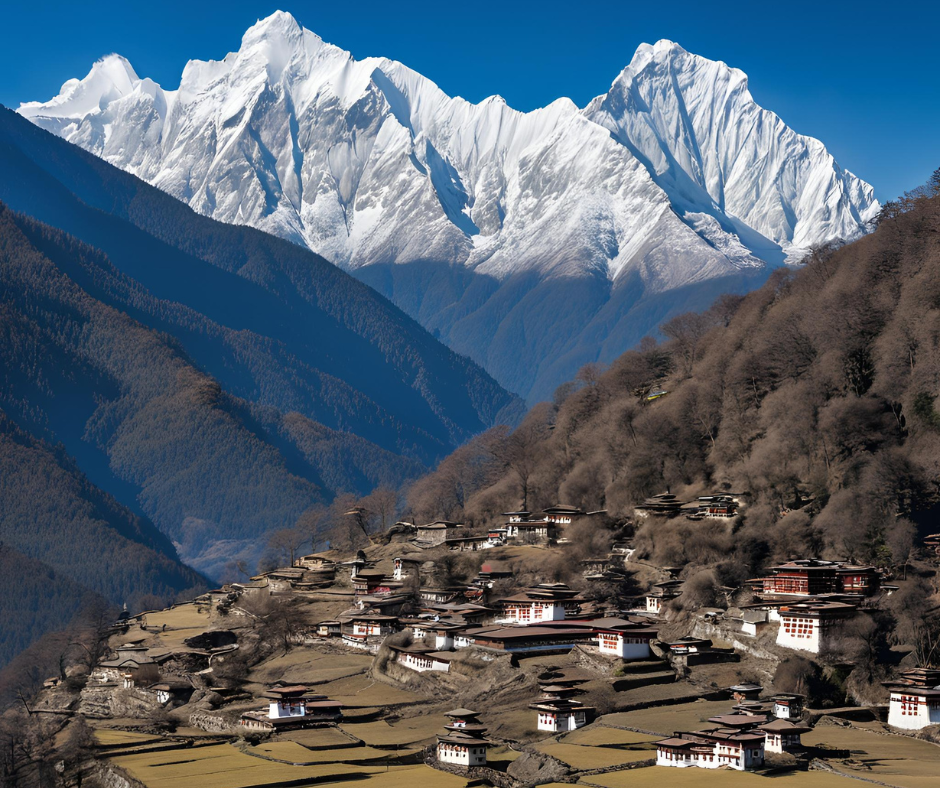
If you’re seeking an adventure that combines trekking, yoga, and a deep dive into local culture, Bhutan is the ideal destination. This remarkable country should be at the top of your travel list, so our Trekking and Yoga Retreat in Bhutan is the perfect way to experience it.
Why Bhutan?
1. High Value, Low Impact Tourism
Bhutan opened its doors to international tourism in 1974, but the country has always taken a cautious approach. Its guiding philosophy of "high value, low impact" tourism ensures that the environment, culture, and way of life remain largely unspoiled. This also means visitors experience Bhutan authentically and meaningfully, free from crowds and commercialism.
Since reopening its borders in 2022, Bhutan has continued its commitment to sustainable tourism, which makes it a more exclusive and less touristic destination. While it may be more expensive than other destinations, the investment is worth it for your once-in-a-lifetime experience.
The Unique and Fascinating Facts About Bhutan: What Makes Bhutan So Special
Cross-National Happiness: A Unique Development Measure
Perhaps Bhutan's most distinctive aspect is its dedication to Gross National Happiness (GNH) over Gross Domestic Product (GDP). Introduced by Bhutan’s fourth king, King Jigme Singye Wangchuck, GNH is a holistic approach to development that emphasizes the well-being of its people over material wealth. GNH is based on four pillars: sustainable development, environmental conservation, cultural preservation, and good governance. Bhutan's focus on happiness has gained international recognition as a model for sustainable development.
Bhutan is one of only three world's carbon-negative countries in the world
Bhutan is one of the world’s carbon-negative countries, meaning it absorbs more carbon dioxide than it emits. Over 70% of Bhutan is covered by forests, which helps offset the nation's carbon emissions. Furthermore, Bhutan’s constitution mandates that at least 60% of its land remain under forest cover. The country relies heavily on hydropower, reducing its dependence on fossil fuels.
A ban on plastic Bags and Tobacco
Before many other nations took environmental concerns seriously, Bhutan banned plastic bags in 1999, showcasing its commitment to ecological preservation. In addition, Bhutan is the only country in the world where the sale and production of tobacco are illegal. While smoking in private is not banned, it is unlawful to sell or cultivate tobacco products. This regulation aligns with Bhutan’s spiritual and cultural values, emphasizing health and mindfulness.
A Deep Respect for Buddhism
Bhutan is a deeply spiritual country, and Vajrayana Buddhism is the official religion. Bhutanese culture and daily life are deeply intertwined with Buddhist philosophy. Monasteries, prayer flags, and stupas dot the landscape, and many Bhutanese people live close to these sacred sites. Je Khenpo, the head of the Bhutanese monastic body, also advises the country's leaders, ensuring that spirituality plays a role in governance.
Thimphu: The Only Capital Without Traffic Lights
In a world where bustling cities are often defined by their chaotic traffic, Bhutan’s capital, Thimphu, is unique for its lack of traffic lights. Instead of automated signals, police officers direct traffic at key intersections. When traffic lights were installed briefly, residents preferred the traditional human touch, and the lights were swiftly removed. This speaks to Bhutan’s emphasis on tradition over modernity.
Traditional Dress as a National Identity
Bhutanese people take great pride in their traditional clothing, which is worn daily. Men wear the "go," a knee-length robe, while women wear the "Kira," an ankle-length dress. Traditional attire is mandatory in public institutions, schools, and official gatherings. This practice has helped preserve Bhutan’s rich cultural heritage amidst globalization.
Preserving the Dzong Architecture
Dzongs, or fortress monasteries, are a distinctive feature of Bhutanese architecture and serve as religious and administrative centers. Each district in Bhutan has its dzong, an essential symbol of its cultural and spiritual heritage. These massive structures, built without nails, are an integral part of Bhutanese identity and often host colorful festivals known as "tsechus," where locals gather for traditional dances and rituals.
2. Trekking in Breathtaking Landscapes
Bhutan is a hiker’s paradise, with its rugged mountains, lush valleys, and pristine forests. Our retreat includes Bhutan’s most iconic trek, the Dagala Thousand Lakes Trek. This 5-day journey takes you through alpine meadows, serene lakes, and panoramic views of the world’s highest peaks, including Mount Everest. You’ll trek through remote villages, see yak herders in their natural environment, and experience the tranquil beauty of Bhutan’s wilderness.
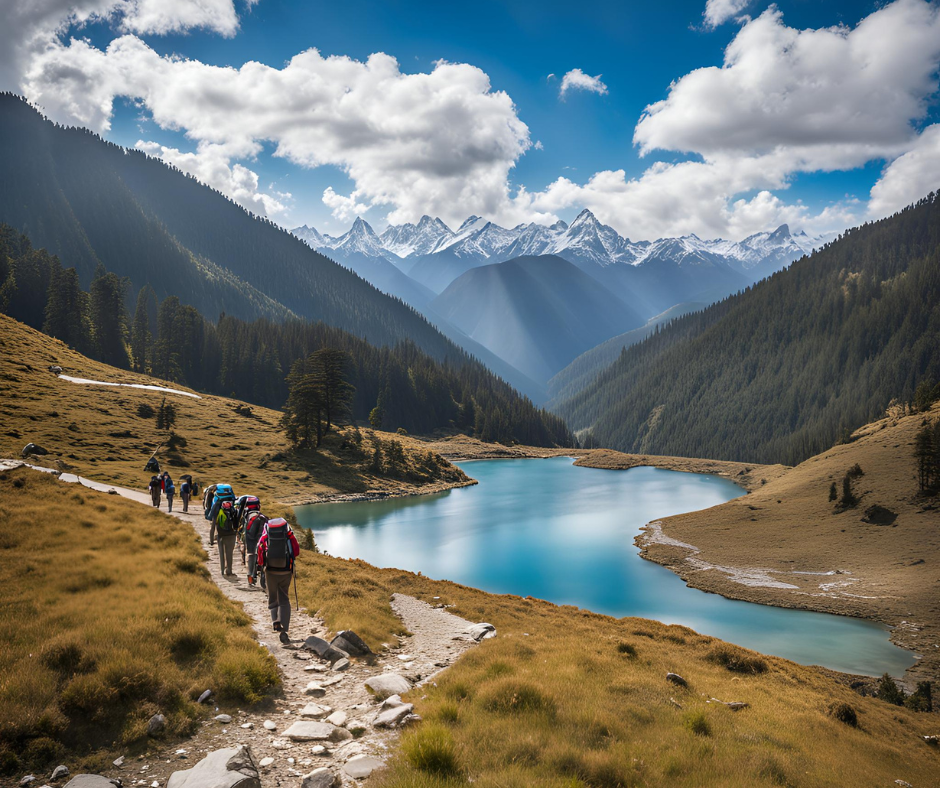

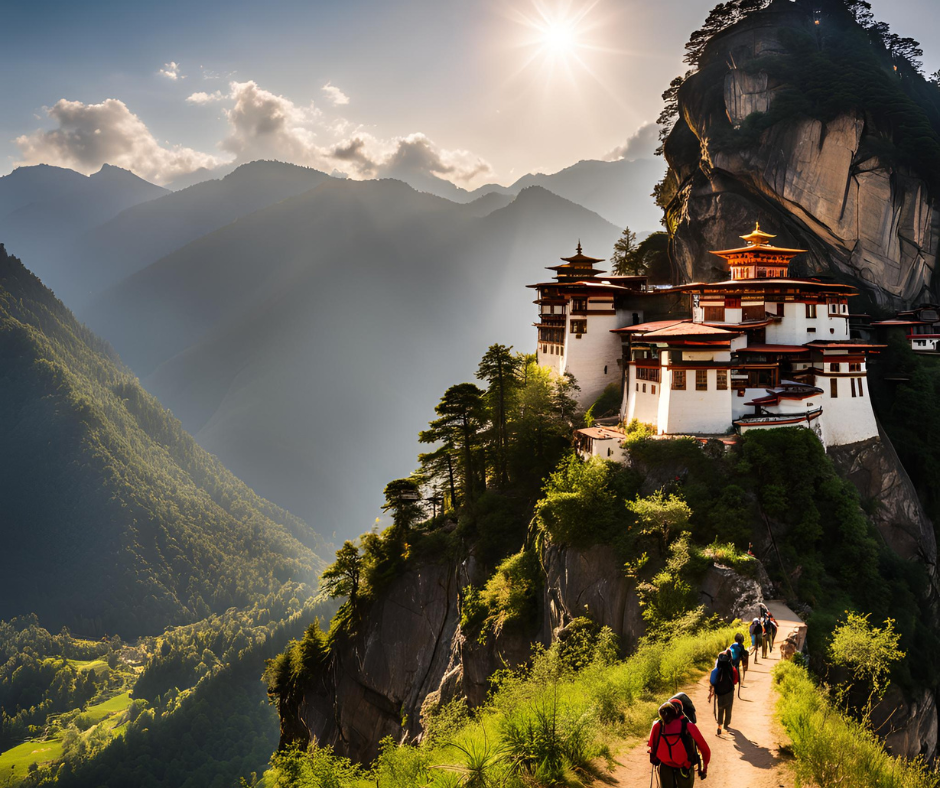
Another highlight is the trek to the famous Tiger’s Nest Monastery, perched dramatically on the edge of a cliff at 3,120 meters. This sacred site is one of the most spiritual places in the world, and hiking to it is an enriching experience for both mind and body.
3. Yoga and Meditation with Monks
What makes our Bhutan retreat truly special is the combination of trekking with daily yoga and meditation sessions. We’ll practice yoga in nature each day, helping you balance your energy and stay grounded during the trek. Bhutan’s spiritual heritage is deeply intertwined with Buddhism, and during our retreat, you’ll also have the opportunity to meditate alongside monks in peaceful temples. This immersive experience allows you to connect with the country’s spiritual essence.
4. Cultural Immersion and Spiritual Connection
Bhutan is where tradition and spirituality are woven into the fabric of daily life. On this retreat, you’ll explore Bhutan's rich culture and history, visiting ancient temples, fortresses, and monasteries. From the moment you step foot in Paro, where our retreat begins, to the bustling streets of Thimphu, Bhutan’s capital, you’ll feel the warmth and hospitality of the Bhutanese people.
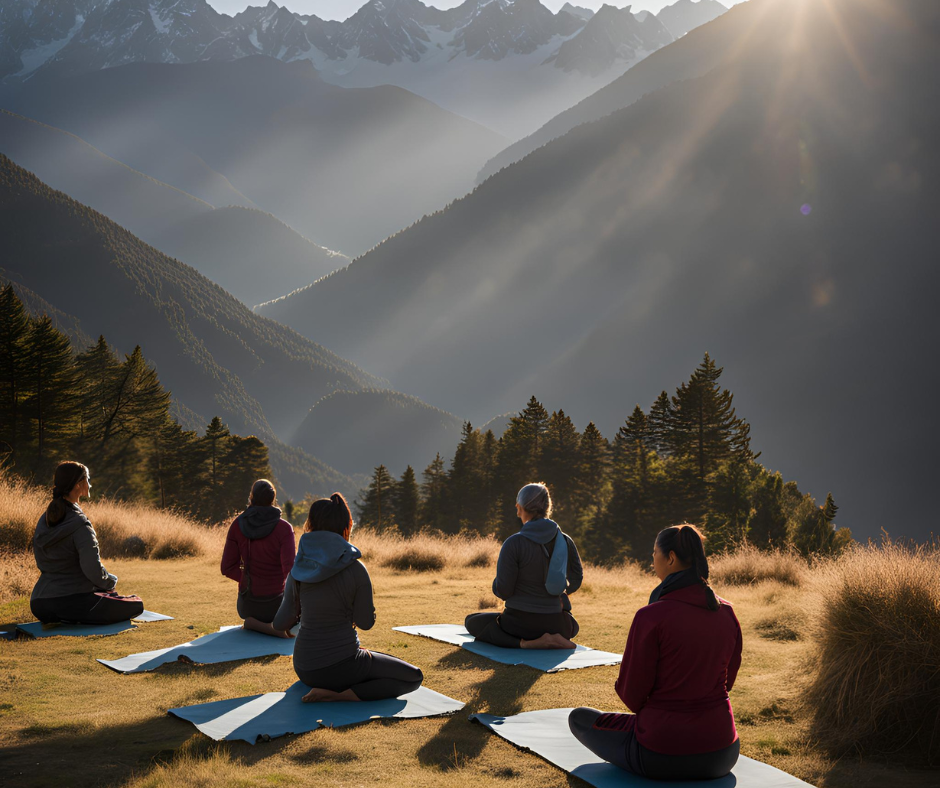
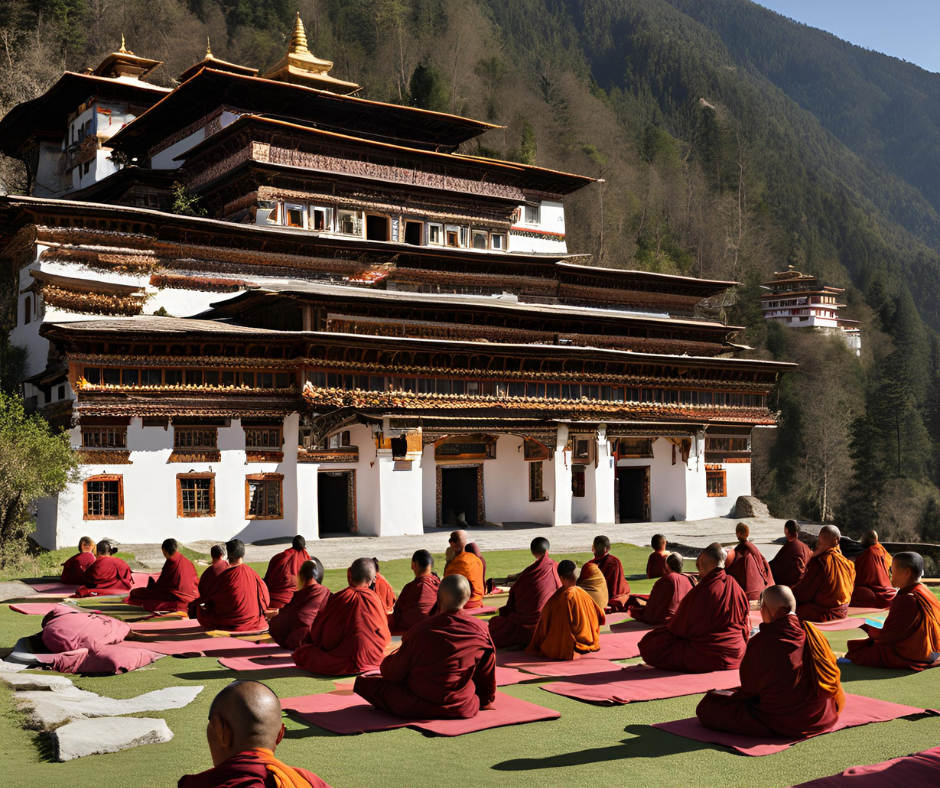
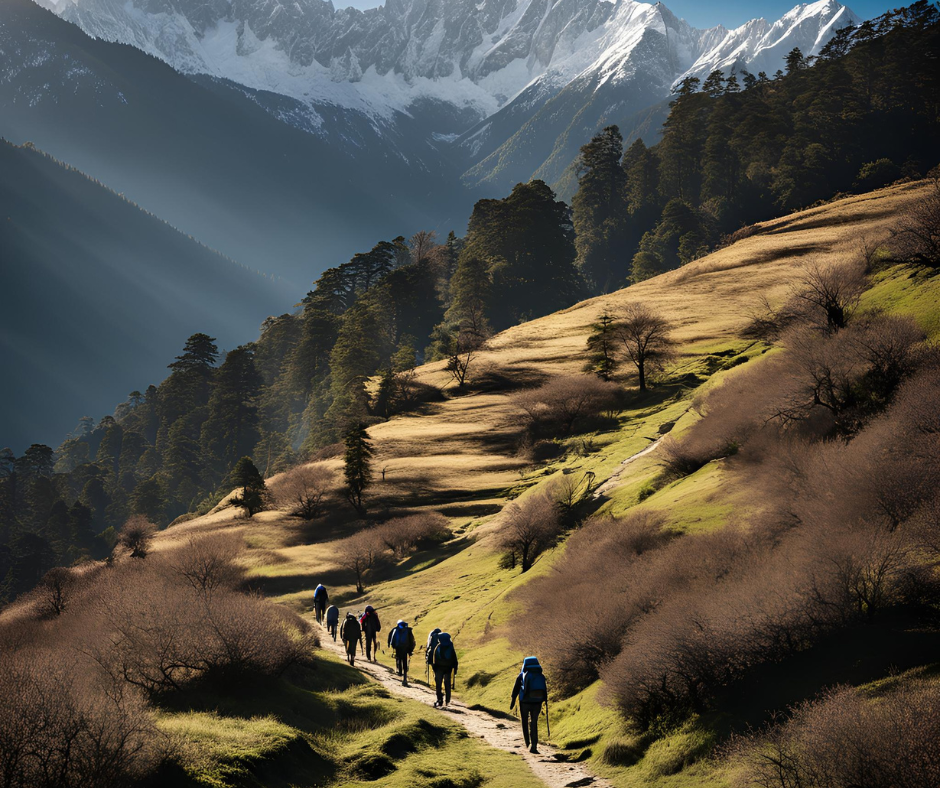
What to Expect from Our Bhutan Trekking and Yoga Retreat
Our Yoga and Trekking Retreat in Bhutan is designed for adventurous people seeking physical challenges and spiritual growth. Here’s a snapshot of what you can expect:
- Start in Paro: We begin in the picturesque town of Paro, where you’ll have time to acclimatize, explore temples, and prepare for the adventure ahead.
- Trek to Tiger’s Nest: We’ll hike to the iconic Tiger’s Nest Monastery, a highlight of the retreat and one of the most awe-inspiring experiences in Bhutan.
- Dagala Thousand Lakes Trek: This 5-day trek through the breathtaking Himalayas offers physical challenges and moments of serenity as we journey through alpine lakes and valleys.
- Daily Yoga and Meditation: Each day of the retreat includes yoga sessions designed to complement our trekking and meditation in sacred spaces like monasteries.
- Cultural Exploration: Along the way, we’ll visit local villages, learn about Bhutan’s deep-rooted Buddhist traditions, and experience the authentic Bhutanese way of life.
- End in Thimphu: Our retreat concludes in Bhutan’s capital city, Thimphu, where you can relax, explore, and reflect on the journey.
Why Travel to Bhutan with Us?
Our small and intimate retreat group ensures personalized attention and a deeper connection with your surroundings.
By joining our retreat, you’ll also have access to knowledgeable local guides who will provide insight into Bhutan’s history, culture, and traditions, making your experience even more decadent.
Ready to Embark on the Journey of a Lifetime?
If you’re looking for a retreat that combines adventure, mindfulness, and cultural immersion, Bhutan is calling you. Our April 18-25, 2025, Yoga and Trekking Retreat is open for bookings, but spots are limited.
Don’t miss this once-in-a-lifetime opportunity to explore one of the world’s most magical destinations.
Sign up now to reserve your spot!
Spain is a perennial favorite among yoga retreat participants and holidaymakers for a multitude of reasons, each contributing to its enduring popularity as a top travel destination.
And here is why:
Stunning Landscapes:
Spain's landscapes and natural beauty are as diverse as they are breathtaking, offering a wide array of experiences for nature lovers and outdoor enthusiasts alike. From pristine beaches along the Mediterranean coast to rugged mountains and lush forests, Spain's scenery is nothing short of spectacular.
Beaches:
Spain is famous for its stunning coastline, which stretches for thousands of kilometers along the Mediterranean Sea, the Atlantic Ocean, and the Bay of Biscay. From the vibrant beaches of the Costa del Sol to the secluded coves of the Balearic Islands, Spain offers something for everyone. Whether you're looking to soak up the sun, swim in crystal-clear waters, or enjoy water sports such as surfing and snorkeling, Spain's beaches are the perfect destination.
Mountains:
Spain is famous for its stunning coastline, which stretches for thousands of kilometers along the Mediterranean Sea, the Atlantic Ocean, and the Bay of Biscay. From the vibrant beaches of the Costa del Sol to the secluded coves of the Balearic Islands, Spain offers something for everyone. Whether you're looking to soak up the sun, swim in crystal-clear waters, or enjoy water sports such as surfing and snorkeling, Spain's beaches are the perfect destination.
National Parks:
Spain is home to several stunning national parks and protected areas that showcase the country's diverse flora and fauna. The Picos de Europa National Park in northern Spain is known for its dramatic limestone peaks, deep gorges, and lush forests, while the Doñana National Park in Andalucia is a UNESCO World Heritage Site renowned for its wetlands and birdwatching opportunities. Other notable parks include the Sierra de Grazalema Natural Park, the Tablas de Daimiel National Park, and the Caldera de Taburiente National Park in the Canary Islands.
Nature Reserves:
Beyond its national parks, Spain is dotted with nature reserves and protected areas that preserve its natural beauty and biodiversity. The Cabo de Gata-Níjar Natural Park in Andalucia is one such example, boasting rugged coastal cliffs, hidden beaches, and volcanic rock formations. The Ordesa y Monte Perdido National Park in the Pyrenees is another gem, offering pristine wilderness, alpine meadows, and stunning waterfalls.
Climate:
With its Mediterranean climate, Spain enjoys mild winters and long, sunny summers, making it an ideal destination for sun-seekers year-round. Whether you're lounging on the beaches of the Balearic Islands or exploring the historic streets of Barcelona, you're sure to enjoy the pleasant weather that Spain has to offer.
Hiking The Thrilling Caminito del Ray
One of the highlights of our retreat was the opportunity to explore the rugged beauty of the Caminito Del Ray trail. Led by experienced guides, we embarked on a journey of discovery, navigating cliffs and winding pathways with awe and reverence.
Nestled amidst the rugged landscapes of Andalucia, Spain, lies one of the world's most exhilarating hiking trails: the Caminito del Rey. This awe-inspiring pathway winds its way through the breathtaking El Chorro Gorge, offering intrepid adventurers a once-in-a-lifetime opportunity to experience the raw beauty of nature from dizzying heights.
Originally built in the early 20th century to provide maintenance access for workers at nearby hydroelectric plants, the Caminito del Rey gained notoriety for its perilous conditions and hair-raising reputation. For decades, the trail fell into disrepair, earning it the nickname "the world's most dangerous walkway" and attracting thrill-seekers from around the globe eager to test their mettle.

In recent years, efforts have been made to restore and renovate the Caminito del Rey, transforming it from a perilous pathway into a safe and accessible hiking trail. Today, visitors can embark on a guided journey along the trail, marveling at the stunning vistas and vertigo-inducing views that have made the Caminito del Rey a bucket-list destination for adventurers everywhere.
The journey along the Caminito del Rey begins with a scenic walkway suspended high above the rushing waters of the Guadalhorce River. As hikers traverse the narrow pathway carved into the sheer cliffs of the gorge, they are treated to panoramic views of the surrounding countryside, with glimpses of soaring eagles and cascading waterfalls adding to the sense of wonder and excitement.
The Caminito del Rey offers an unforgettable adventure that will be remembered for a lifetime. Whether you're a seasoned hiker seeking a new challenge or a nature enthusiast eager to experience the wonders of Andalucia's rugged landscapes, the Caminito del Rey is sure to leave you breathless in more ways than one.
Yoga Retreat Center
Our Yoga retreat center is located 3 km from the charming village of El Gastor.



The accommodations are rooms in villas with views of the mountain, air conditioners, and heaters and there is wifi inside all the buildings. Villas have a bedroom with a double bed, a living room with a fold-out sofa, an open kitchen, a bathroom, a balcony, and a pool. The 19 rooms can be single, double, triple, or quadruple occupancy and have air conditioning, heaters, and free wifi.
We have at our disposal a comfortable yoga studio with all the necessary equipment such as yoga mats, blocks, blankets, and bolsters.



Enjoying Nourishing Vegetarian Delights
At our yoga retreat, we believe that nourishing the body with wholesome, vegetarian food is an essential part of the holistic experience. Inspired by the bounty of Andalucia's fertile lands and the rich tradition of Mediterranean cuisine, our meals are crafted with care using locally sourced ingredients, ensuring that each bite is a celebration of flavor, freshness, and vitality.
Drawing upon the abundance of local produce, our menu showcases the vibrant flavors and vibrant colors of Andalucia's culinary heritage. From the rich, golden hues of locally produced olive oil to the earthy sweetness of ripe tomatoes and peppers, each ingredient is carefully selected to create dishes that delight the senses and nourish the soul.
Our meals are designed to provide a balance of nutrients and flavors, offering a variety of plant-based proteins, whole grains, and fresh vegetables to fuel your body and support your practice. Whether you're indulging in a hearty bowl of lentil soup, savoring a colorful salad bursting with seasonal vegetables, or enjoying a comforting plate of vegetable paella, our menu is sure to satisfy even the most discerning palate.
Our vegetarian menu is not only delicious—it's also designed to inspire and empower you to make healthier choices long after you leave our retreat. By showcasing the incredible diversity and versatility of plant-based ingredients, we hope to ignite a passion for cooking and eating well that will continue to nourish your body, mind, and spirit for years to come.
Improve and deepen your yoga practice!
With multiple sessions each day, you have the opportunity to practice yoga more extensively than you might in your routine. This extended practice can help you refine your poses, build strength and flexibility, and deepen your understanding of yoga techniques. The expertise of an experienced yoga teacher can help you refine your alignment, explore advanced practices, and overcome any challenges you may encounter.
Retreats often incorporate workshops or discussions on yoga philosophy, history, and spirituality. This exploration can deepen your understanding of the philosophical principles underlying yoga and inspire you to integrate these teachings into your practice and daily life.
You can try and practice different styles of yoga.
Practicing and learning different styles of yoga can greatly benefit you in finding the right practice for different days or stages of life in the future in several ways:
- Understanding Your Preferences: Trying out various yoga styles allows you to understand what resonates most with you. You might find that you prefer the dynamic flow of Vinyasa one day, while on another day, you crave the grounding stillness of Yin yoga. This understanding helps you choose the most suitable practice for your current needs.
- Adaptability: Life is dynamic, and your needs and energy levels can vary from day to day. Learning different styles of yoga equips you with a range of techniques and practices that you can adapt to suit your mood, energy level, or specific circumstances. For example, if you're feeling stressed, you might opt for a calming practice like Restorative yoga, whereas if you need an energy boost, you might choose a vigorous Ashtanga practice.
- Targeted Benefits: Each yoga style offers unique benefits for the body, mind, and spirit. By exploring different styles, you can identify which practices address specific needs or goals. For instance, if you're recovering from an injury, you might focus on gentle, therapeutic styles like Iyengar yoga. If you're seeking spiritual growth, you might gravitate towards practices that incorporate meditation and breathwork, such as Kundalini yoga.
- Holistic Approach: Combining different yoga styles allows for a more holistic approach to your practice. You can integrate elements of strength-building, flexibility, mindfulness, relaxation, and breathwork into your routine, ensuring that you address all aspects of your well-being.
- Preventing Plateaus: Practicing the same style of yoga exclusively can sometimes lead to plateaus in your practice or personal growth. Exploring different styles challenges your body and mind in new ways, preventing stagnation and facilitating continuous growth and evolution.
- Life Transitions: As you navigate different life stages or transitions, your yoga needs may evolve. For example, during periods of high stress, you might prioritize practices that promote relaxation and stress relief, while during times of change or uncertainty, you might seek grounding and stability through your yoga practice. Having familiarity with various styles allows you to adapt your practice to support you through different life circumstances.
Pilates helps Yogis engage their core!
Yoga and Pilates don’t have to be two separate practices. They can work together hand by hand, to help strengthen your core, lengthen your side body, avoid injury, and improve your alignment. Pilates’s focus on building and engaging a strong core can propel one's yoga practice into new realms.
Pilates is a comprehensive form of exercise that can help you become stronger by targeting core muscles, improving muscle endurance, enhancing flexibility, promoting good posture, and supporting overall functional strength and mobility.
Pilates is known as a "workout," and yoga as a "practice"; however, the irony here is that, to improve at anything, we have to practice, and when we practice well both Pilates and yoga can be exceptional workouts.
Our retreat Pilates teacher is Kaia Heinleht from Estonia.
More information about her in the Estonian language is here.
Kaia is one of the backbones, and foundations of Estonian Pilates, having been introduced, practiced, and taught Pilates for over twenty years. During all these years, she has consistently developed her skills at various international training under-recognized Pilates master teachers such as Kelly McKinnon, Debora Lessen, and Amy Taylor Alpers. The last training was the Kathy Corey Postgraduate Mentor Program in Germany in 2018.



In addition to Pilates, in recent years Kaia has been improving herself in the field of osteopathy, and in 2015 she started studying kinesiology TFH (Touch For Health). Relying on her acquired knowledge and practice of thousands of hours in the fields listed above, Kaia has developed her physical education training course. Physiotherapists and rehabilitation specialists working in the Estonian medical system have improved their knowledge under his guidance.
Our retreat Yoga teacher and hiking guide is Pille Mitt.
Read more about Pille here.
You can book your next yoga & hiking retreat in Spain here.
Life is a journey marked by various stages, each presenting its own set of challenges, joys, and opportunities for growth. Just as our bodies and minds evolve over time, so too should our approach to self-care and well-being. Yoga, an ancient practice that harmonizes the body, mind, and spirit, offers a versatile toolkit that can adapt to the changing needs of individuals at different stages of life. From the exuberance of youth to the wisdom of old age, here's how yoga practices can be tailored to match the unique demands of each stage.
Youth: Embracing Energy and Exploration
In the vibrant phase of youth, energy flows abundantly, and the spirit of exploration is at its peak. This is a time of discovering one's identity, pursuing passions, and laying the foundation for the future. Yoga can serve as a valuable companion in this journey, providing a holistic approach to physical health, mental clarity, and emotional balance.
Incorporating Yoga into Daily Life
For young adults navigating the fast-paced demands of modern life, integrating yoga into daily routines can offer grounding amidst the chaos. Simple practices such as Sun Salutations (Surya Namaskar) or energizing flows like Vinyasa yoga can invigorate the body and sharpen focus. Additionally, pranayama techniques, such as Kapalabhati (skull-shining breath) or Bhastrika (bellows breath), can enhance vitality and mental clarity, allowing young individuals to approach challenges with vigor and resilience.
Yoga Retreats for Self-Discovery
Yoga retreats tailored for young adults provide an immersive experience that combines physical activity, mindfulness, and community building. These retreats often feature dynamic yoga sessions, workshops on stress management and goal setting, and opportunities for outdoor adventures. By stepping away from the distractions of daily life, participants can delve deeper into self-discovery, gaining clarity of purpose and direction for the future.
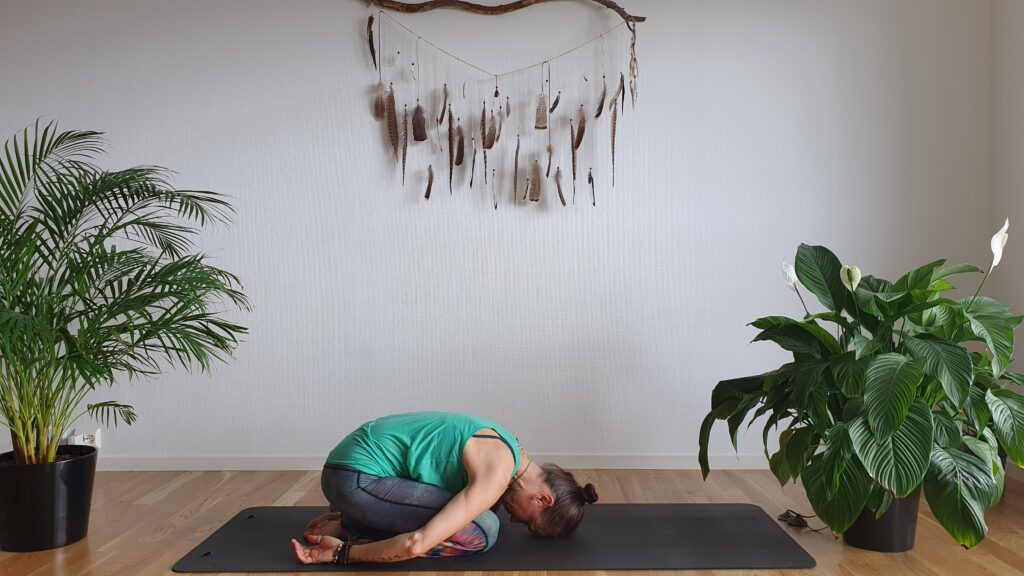
Adulthood: Balancing Responsibilities and Wellness
As adulthood brings forth a myriad of responsibilities – career, relationships, and family – finding balance becomes paramount. Yoga offers a sanctuary amidst the hustle and bustle of daily life, promoting physical well-being, mental resilience, and emotional equilibrium.
Mindful Movement for Stress Relief
In the midst of hectic schedules, incorporating gentle yoga practices can alleviate stress and tension accumulated throughout the day. Restorative yoga poses, such as Child's Pose (Balasana) or Legs-Up-the-Wall (Viparita Karani), encourage deep relaxation and release muscular tension. Moreover, mindfulness-based practices, such as Yoga Nidra or guided meditation, foster mental clarity and emotional stability, enabling individuals to navigate challenges with grace and composure.
Yoga for Connection and Community
In the whirlwind of adult life, cultivating meaningful connections and nurturing relationships is essential for holistic well-being. Yoga communities provide a supportive environment where individuals can come together to practice, share experiences, and foster a sense of belonging. Whether through attending group classes, workshops, or yoga retreats focused on personal growth and connection, adults can find solace in the company of like-minded individuals, strengthening bonds and deepening connections with oneself and others.
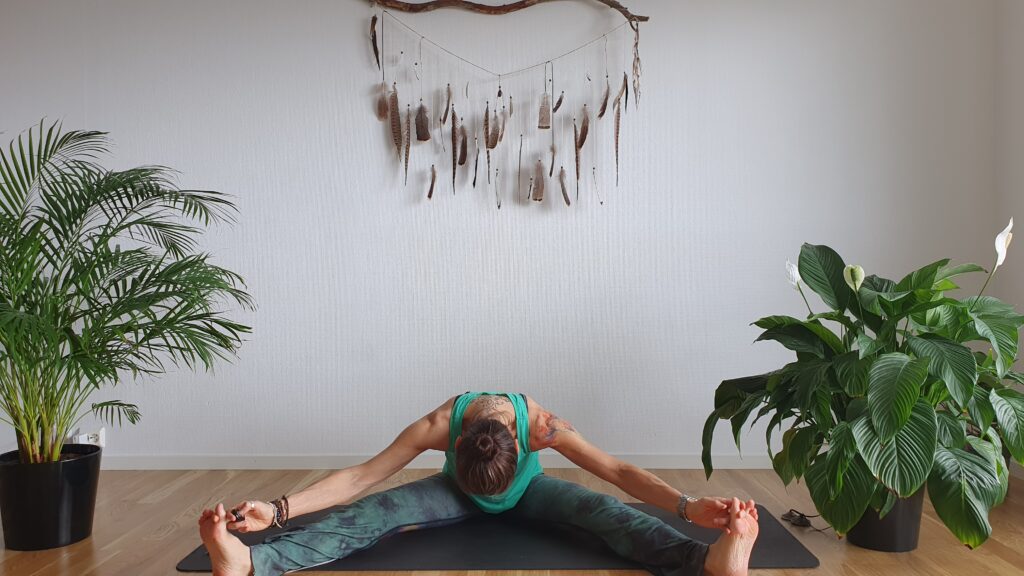
Middle Age: Cultivating Strength and Resilience
Middle age heralds a period of transition, marked by shifts in priorities, roles, and perspectives. As individuals navigate the ebb and flow of life's currents, yoga serves as a steadfast anchor, fostering physical vitality, mental fortitude, and emotional resilience.
Strength-Building Yoga Practices
As the body undergoes subtle changes with age, maintaining strength and flexibility becomes increasingly important. Yoga practices that focus on strength-building, such as Ashtanga or Power Yoga, help to tone muscles, improve balance, and enhance overall physical resilience. Additionally, incorporating props such as blocks, straps, or bolsters can provide support and accessibility, allowing individuals to adapt their practice to suit their evolving needs.
Yoga Retreats for Renewal and Reflection
Yoga retreats tailored for individuals in middle age offer a sanctuary for renewal and reflection amidst life's transitions. These retreats often feature a blend of dynamic and restorative yoga practices, mindfulness exercises, and contemplative activities aimed at fostering self-awareness and inner growth. By stepping away from familiar routines and immersing oneself in a supportive environment, participants can gain clarity, renew their sense of purpose, and emerge with a renewed sense of vitality and purpose.
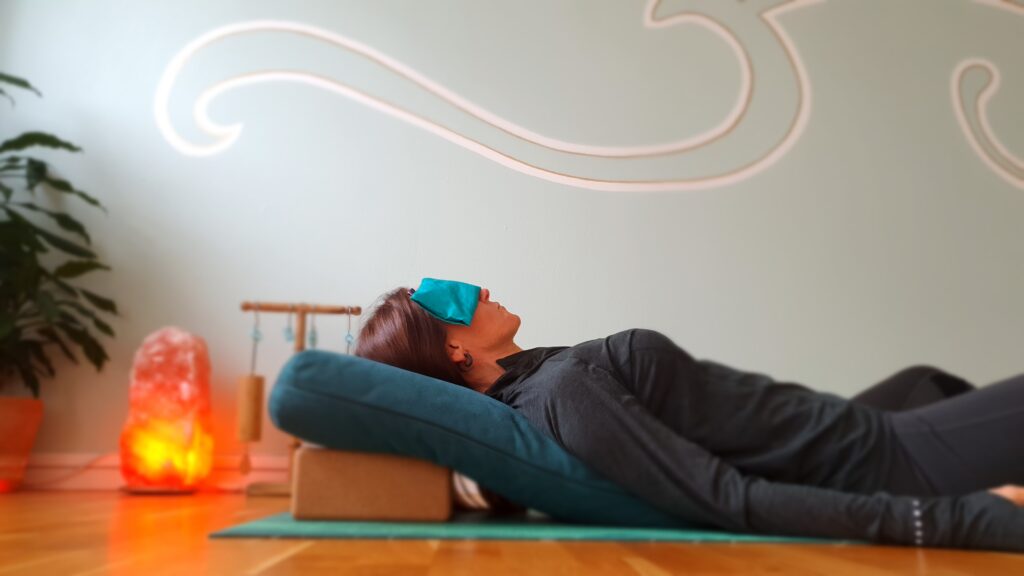
Old Age: Nurturing Mind, Body, and Spirit
In the golden years of old age, prioritizing holistic well-being becomes paramount. Yoga offers a gentle yet powerful means of nurturing the mind, body, and spirit, promoting vitality, serenity, and spiritual fulfillment.
Gentle Yoga Practice for Mobility and Comfort
As the body naturally slows down with age, gentle yoga practices provide a safe and effective way to maintain mobility, flexibility, and overall well-being. Chair yoga, gentle Hatha yoga, and Yin yoga are particularly well-suited for older adults, offering modified poses and ample support to accommodate varying levels of mobility and comfort. These practices help to alleviate stiffness, improve circulation, and promote relaxation, allowing individuals to age gracefully and with dignity.
Yoga Retreats for Wellness and Wisdom
Yoga retreats catered to older adults offer a nurturing space for wellness and wisdom, celebrating the richness of life's journey and the wisdom accrued over the years. These retreats often feature gentle yoga practices, guided meditation, and opportunities for reflection and storytelling. By embracing the present moment with gratitude and acceptance, participants can cultivate a deep sense of inner peace, contentment, and spiritual fulfillment, embracing the fullness of life's experiences with grace and equanimity.
In conclusion, yoga is a timeless companion that adapts and evolves alongside individuals at every stage of life. Whether in the exuberance of youth, the responsibilities of adulthood, the transitions of middle age, or the serenity of old age, yoga offers a holistic pathway to well-being, resilience, and self-discovery. By embracing the transformative power of yoga practices tailored to match the unique needs of each stage, individuals can navigate life's journey with vitality, grace, and inner harmony.
This article provides insights into how yoga practices can be adapted to meet the needs of individuals at different stages of life, from youth to old age. Through mindful movement, connection, and self-reflection, yoga offers a holistic approach to well-being that supports physical health, mental clarity, and emotional resilience at every stage of life.
The mother-daughter relationship is one of the most complex and profound connections in human existence. As adult daughters navigate the challenges of life, the bond with their mothers takes on new dimensions, requiring a delicate balance of independence and closeness. In the pursuit of fostering a healthy connection, unconventional approaches, such as yoga and hiking retreats, can provide a unique and transformative space for quality time and personal growth.
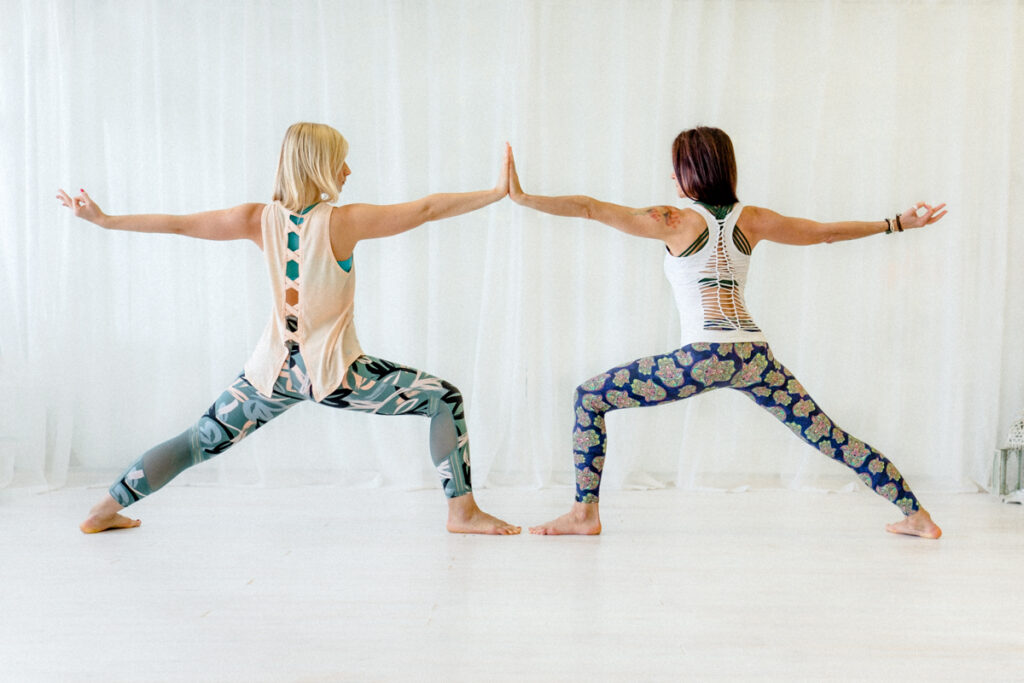
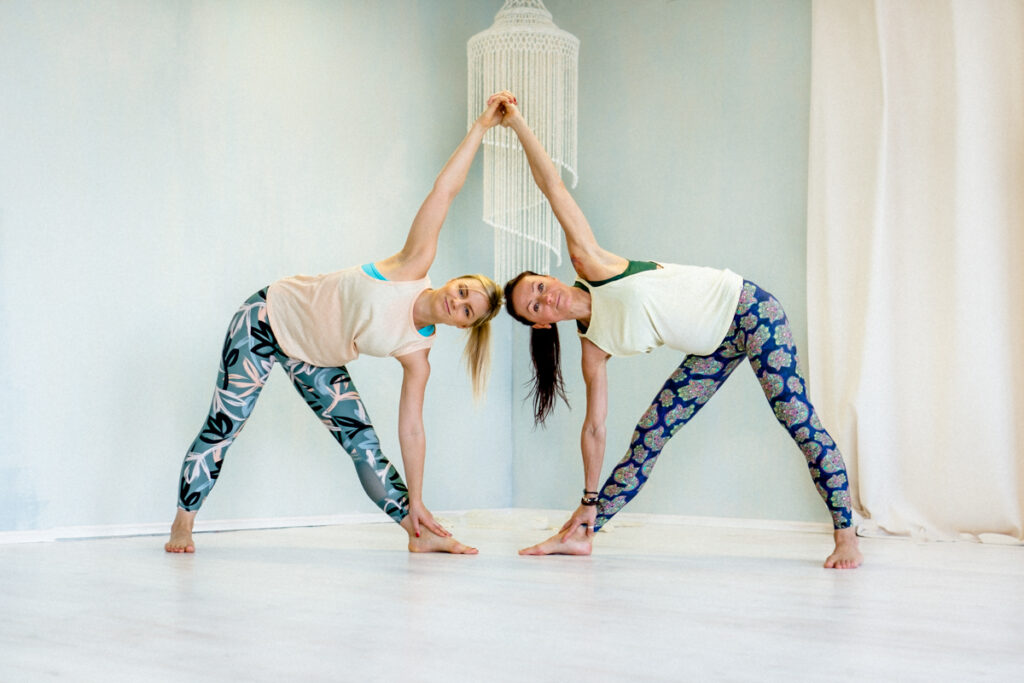
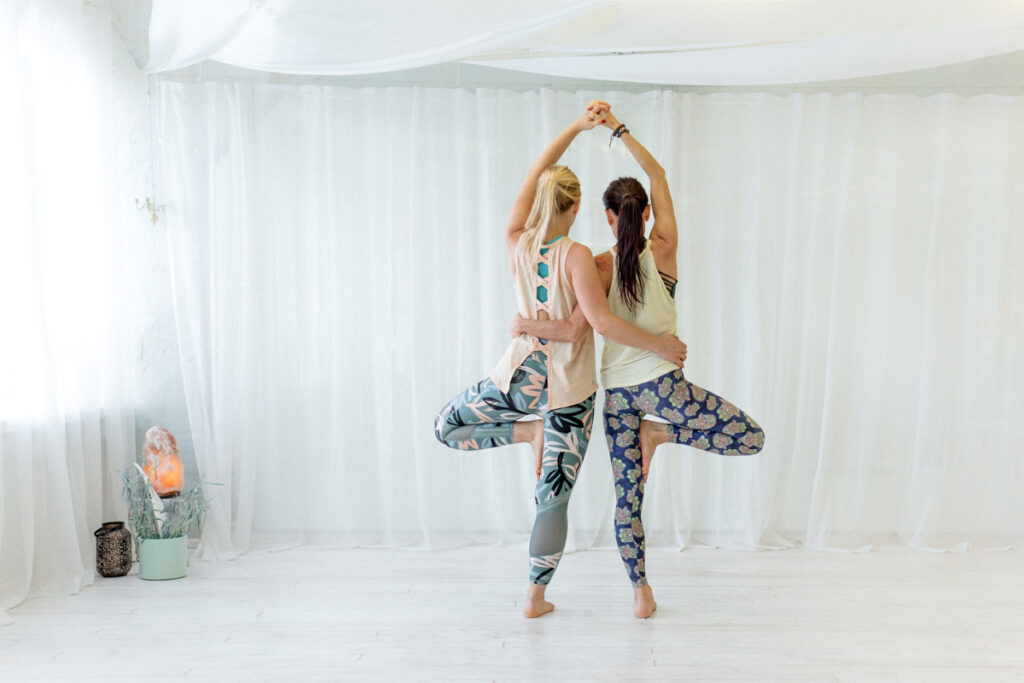
The Dynamics of Mothers-Adult Daughters Relationships:
The dynamics between mothers and adult daughters can be intricate, influenced by a lifetime of shared experiences, evolving roles, and individual growth. As daughters enter adulthood, the relationship often shifts from a more parent-child dynamic to a friendship grounded in mutual respect and understanding. However, this transition isn't always seamless, and maintaining a healthy connection requires effort from both parties.
Mothers and Adult Daughters Quality Time: A Catalyst for Connection:
Finding quality time for meaningful interactions can be challenging in our fast-paced world. This is where the idea of a yoga and hiking retreat comes into play. These retreats offer a purposeful escape from the demands of daily life, creating a serene environment conducive to self-reflection and strengthened connections.
Yoga for Mind-Body Harmony:
Yoga is not just a physical exercise but a holistic practice promoting mental and emotional well-being. Participating in yoga sessions can provide mothers and daughters with a shared experience, fostering a sense of unity. Practicing mindfulness and deep breathing can open communication channels, creating a space for vulnerability and understanding.
Hiking for Shared Adventure:
Embarking on a hiking and yoga retreat introduces an element of shared adventure and challenges that can strengthen the bond between mothers and adult daughters. Physical activity not only promotes health but also encourages teamwork and mutual support. Overcoming obstacles together on the trail can be a metaphor for navigating life's challenges side by side.
The Healing Power of Nature:
A yoga and hiking retreat surrounded by the beauty of nature provides an ideal setting for healing and rejuvenation. Away from the distractions of daily life, mothers and daughters can reconnect with themselves and each other. The serene backdrop becomes a canvas for shared memories, fostering a deeper understanding of each other's perspectives.
Reflection and Communication:
Retreats offer a unique opportunity for reflection and open communication. Mother and daughter can engage in meaningful conversations about their journeys, aspirations, and challenges. The retreat becomes a safe space for honest and authentic dialogue, strengthening their emotional bond.
Deepening Connections Through Shared Learning:
A yoga and hiking retreat focuses on physical activities and provides opportunities for shared learning. Engaging in workshops or classes together, whether learning new yoga poses or gaining wilderness survival skills during hikes, can be an enriching experience. This shared acquisition of knowledge creates a sense of camaraderie, encouraging mutual growth and understanding.
Empowering Each Other:
One of the beautiful aspects of a yoga and hiking retreat is the encouragement to step out of your comfort zone. Mothers and daughters can find themselves in unfamiliar situations, facing physical challenges or exploring aspects of their personalities previously untapped. This shared journey of self-discovery and empowerment can bring about a newfound appreciation for each other's strengths and vulnerabilities.
Digital Detox for Authentic Connection:
In the age of constant connectivity, a retreat provides a rare opportunity for a digital detox. Away from the screens and distractions, mothers and daughters can immerse themselves in the present moment, fostering authentic connections. Unplugging from the virtual world allows for deeper conversations, enhanced emotional bonding, and a more profound shared experience.
Creating Lasting Memories:
The retreat becomes a canvas for creating lasting memories. Whether it's the breathtaking sunrise during a morning yoga session or the sense of accomplishment after completing a challenging hike, these shared moments become touchstones in the mother-daughter relationship. The memories forged in the retreat environment can serve as a source of strength and nostalgia, reinforcing their unique bond.
Practicing Gratitude:
A key element of many yoga retreats is the practice of gratitude. Taking time each day to reflect on the positive aspects of life can shift perspectives and create a more positive atmosphere. Encouraging mothers and daughters to express gratitude towards each other during the retreat fosters a sense of appreciation and acknowledgment, strengthening the foundation of their relationship.
Sustaining the Connection Beyond the Retreat:
The impact of a yoga and hiking retreat doesn't end when the journey concludes. Encouraging mothers and daughters to integrate the lessons learned into their daily lives ensures that the positive changes experienced during the retreat become lasting. Implementing mindfulness practices, engaging in physical activities, and maintaining open communication are ways to sustain the strengthened connection long after the retreat.
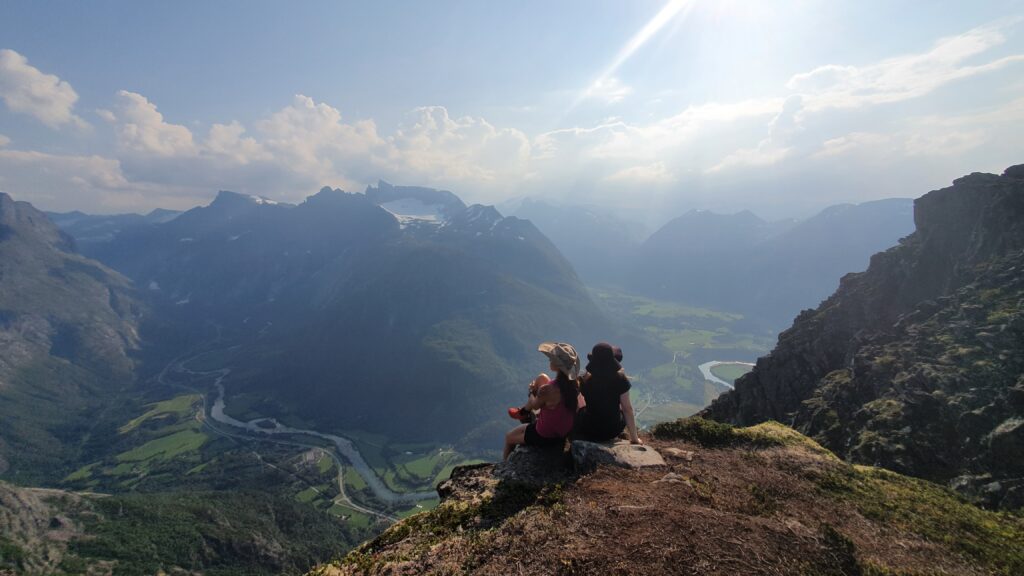
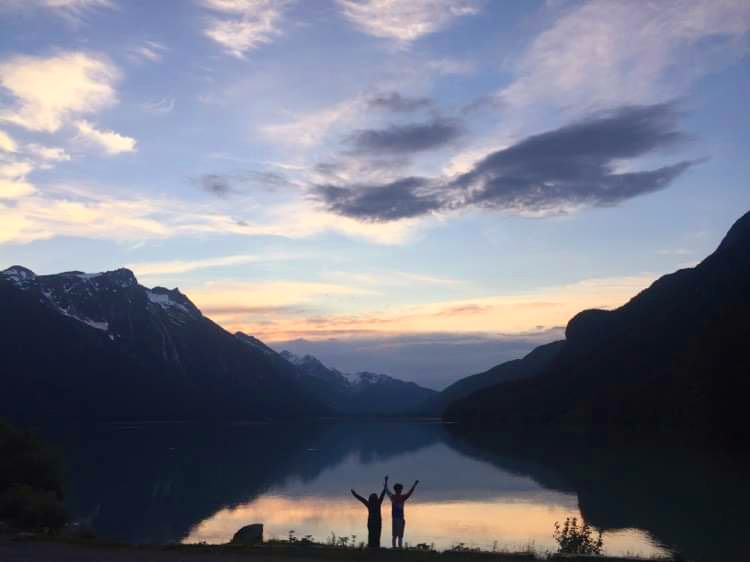
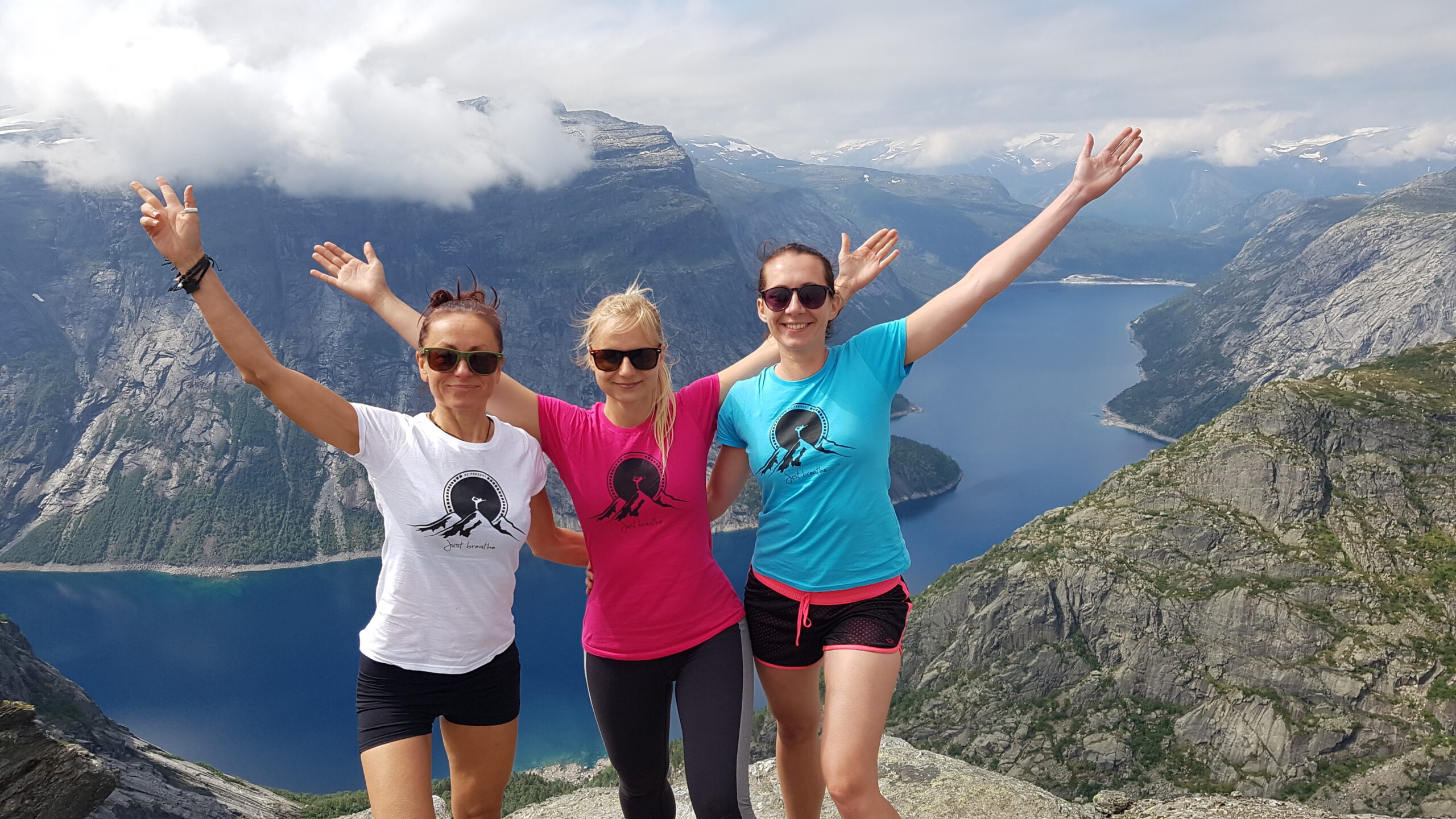
Conclusion:
The importance of quality time cannot be overstated in the pursuit of a healthy mother-adult-daughter relationship. The yoga and hiking retreat serves as a transformative experience, blending physical activity, mindfulness, and the beauty of nature to create an environment conducive to personal growth and strengthened connections. By embracing these unconventional approaches, mothers and daughters can embark on a journey of self-discovery and shared experiences, fostering a bond that withstands the test of time.
Discover our selection of yoga and hiking retreats here.
Read a blog post, "What is yoga retreat..." here.
In Pranayama, breathing is elevated to a controlled, extended process of exhalation and inhalation. This generates the cosmic energy of prana, the life force that provides the strength, power, and vitality required for any activity - B.K.S. Iyengar
Pranayama is generally defined as breath control. Although this interpretation may seem correct because of the practices involved, it does not convey the full meaning of the term. The word pranayama is comprised of two roots: 'prana' plus 'ayama'. Prana means vital energy or life force. It is the force that exists in all things, whether animate or inanimate. Although closely related to the air we breathe, it is more subtle than air or oxygen. Therefore, pranayama should not be considered as mere breathing exercises aimed at introducing extra oxygen into the lungs. Pranayama utilizes breathing to influence the flow of prana in the nadis or energy channels of the pranamaya kosha or energy body.
The word Yama means to control and is used to denote various rules and codes of conduct. However, this is not the word that is joined to prana to form pranayama; the correct word is Ayama which has far more implications. Ayama is defined as an extension or expansion. Thus, the word pranayama means extension or expansion of the dimension of prana. The techniques of pranayama provide the method whereby the life force can be activated and regulated to go beyond one's normal boundaries or limitations and attain a higher state of vibratory energy and awareness.
Four aspects pf pranayama:
- Inhalation or pooraka
- Exhalation or rechaka
- Internal breath retention or antar kumbhaka
- External breath retention or bahir kumbhaka
The different practices of pranayama involve various techniques that utilize these four aspects of breathing.
The mind and breath
It is said that the mind and the breath are one's constant companions. Where there is a breath, there the mind is focused, and where there is an active mind, so is the breath focused. Pranayama seeks to quiet the mind, controlling it through the deep and rhythmic flow of inhalations and exhalations.
The sound of the breath
The pranayamic breath has a sound of its own: Soham. The sound of the inhalation is "as" and that of the exhalation is "ham". "Soham" has been interpreted as "He, I am and I am He". During pranayama, concentration is drowned solely in the action of the breath, and it is this attentive awareness of the breath that leads to the art of dhyana, or meditation.
The art of inhaling not only focuses the mind on the breath, but also brings one into contact with their essence, or soul. With the retention of the breath during the inhalation, the soul becomes wedded to the body. This is the divine union of the soul with our nature or body. During the process of exhalation, the soul re-enters into an unfathomable space. The mind dissolves and the divine marriage of Prakriti, the body, and Purusha, the soul, occurs.
Just as the practice of asanas, or poses, is seen as yoga in action, developing the individual's knowledge of the body, mind, and consciousness, the practice of pranayama is said to lead on toward the path of love minus lust, which is known as Bhakti Marga. Among the eight limbs of yoga, pranayama is therefore seen as the heart of the practice.
Contra-indications:
- Pranayama should not be practiced during illness
- Some pranayamas are not recommended for beginners
Time and place of the practice
The best time to practice pranayama is down when the body is fresh and the mind is very few impressions. If this is not possible, another good time is just after sunset. Try to practice regularly at the same time and place each day. Do not be in a hurry. Practice before eating in the morning or wait for at least three to four hours after meals before starting pranayama. Practice in a quiet, clean, and pleasant room, which is well-ventilated but not draughty. Pranayama should be performed after shatkarmas and asanas, and before meditation practice.
There are many different pranayamas:
- Nadi Shodana Pranayama. The word Nadi means channel or flow of energy and Shodana means purification. Nadi Shodana, therefore, means that practice that purifies the Nadis.
- Ujjayi Pranayama. The word ujjjayi means victorious, it is also known as psychic breath.
- Sheetali Pranayama which means cooling breath.
- Sheetkari Pranayama which means hissing breath.
- Brahmari Pranayama which means humming bee breath.
- Bhastrika Pranayama which means bellows breath.
- Kapalbhati Pranayama which means frontal brain cleansing breath. Kapalbhati is the practice that brings a state of light or clarity to the frontal region of the brain.
- Moorchha Pranayama which means swooning or fainting breath.
- Surya Bheda Pranayama which means vitality-stimulating breath.
Benefits of pranayama:
- Decreases stress
- Improves sleep quality
- Increases mindfulness
- Helps lower blood pressure
- Improves lung function
- Improves immune system
The blog post about powerful yogic breathing for beginners is here.
Nadi Shodana pranayama for beginners 12-minute YouTube video is here.
Nadi Shodana Pranayama with antar kumbakha 17 minutes youtube video is here.
You can start your yogic journey here.
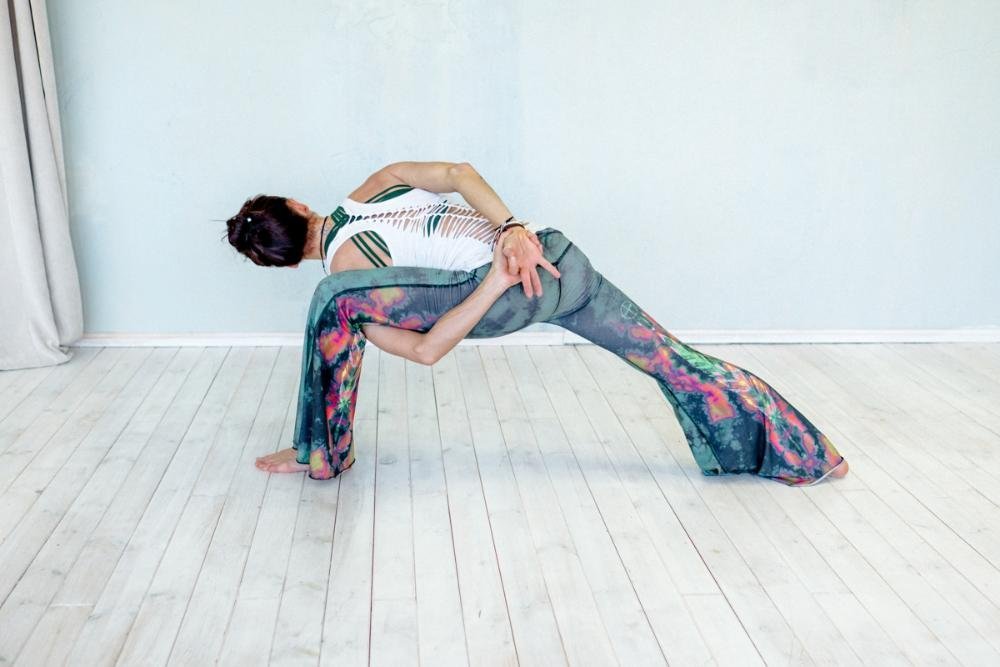
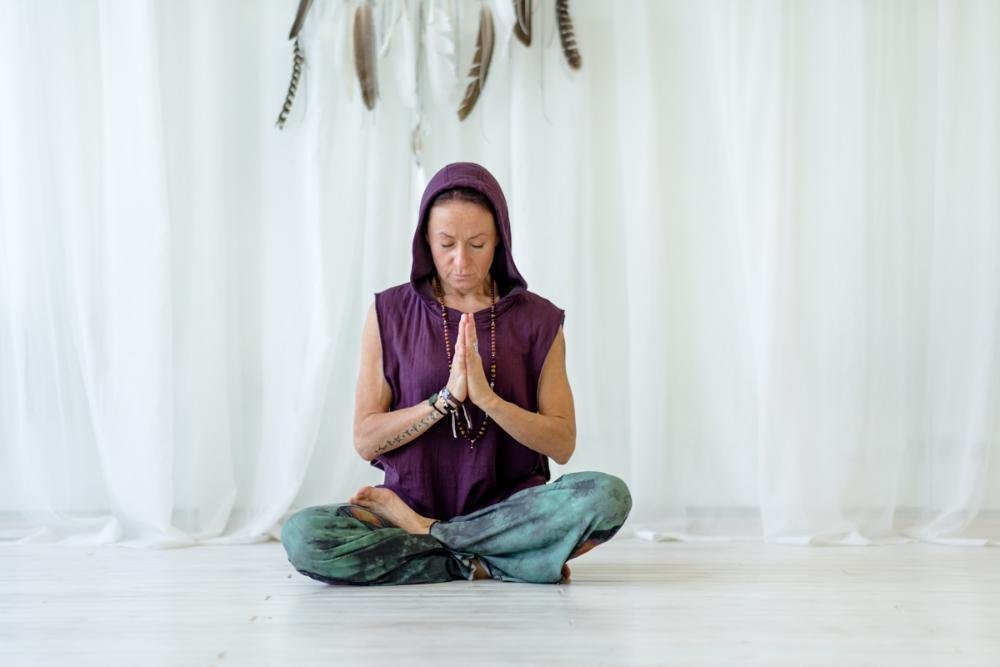
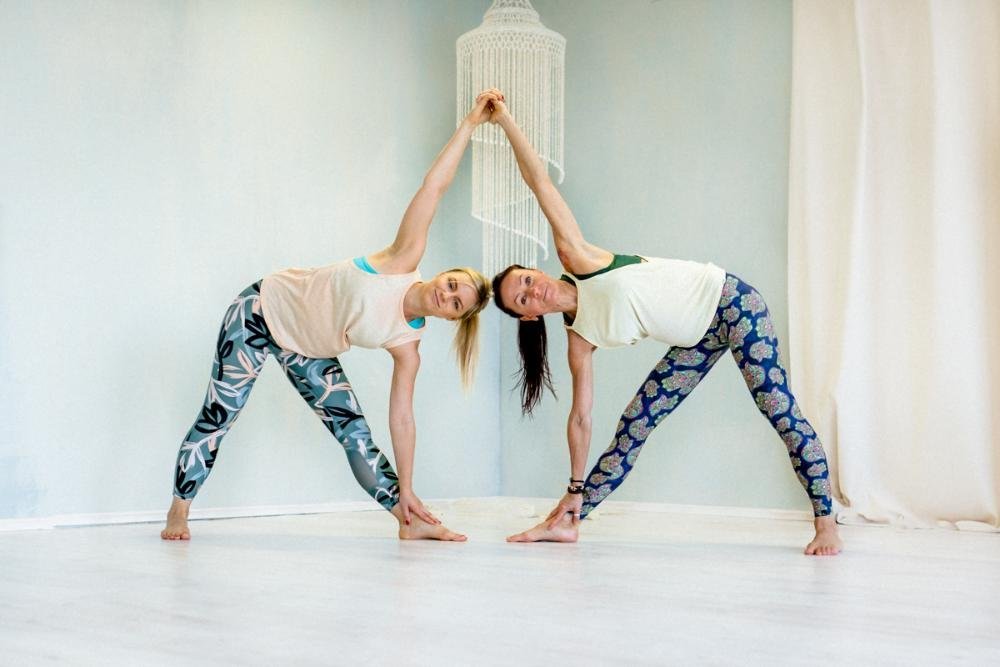
Unlock the secrets to a successful yoga journey on the 10 common mistakes to avoid when beginning your practice. Start your yoga practice on the right foot, cultivating self-awareness and embracing the transformative power of yoga.
Yoga is a beautiful and transformative practice that can bring physical and mental well-being into your life. Whether you're new to yoga or considering it a try, it's essential to be aware of common mistakes that beginners often make. By avoiding these pitfalls, you can embark on your yoga journey with confidence and success. Here are ten of the biggest mistakes to steer clear of:
1. Choosing the Wrong Class or Style
Not all yoga classes or styles are the same. Choosing the wrong one for your needs and preferences can lead to a lack of interest or motivation. Explore different styles and teachers to find what resonates with you. Determine what you want to achieve through yoga. Understanding your goals will help you select the most appropriate style. Take into account your current fitness level. Some yoga styles are more physically demanding than others. If you are new to exercise, you may want to start with a gentler style and gradually progress. You can read more about different styles of yoga here.
2. Being Impatient
Yoga is about the journey, not just the destination. Rushing through poses or expecting immediate results can lead to frustration. Patience is key.
3. Inconsistency
Yoga benefits from regular practice. Inconsistent or sporadic practice won't yield the same results as routine practice. Set a schedule that works for you and try to stick to it.
The act of setting aside time for yoga practice can instill discipline and mindfulness, making it easier for beginners to maintain the habit over the long term. The community and support from fellow practitioners in a yoga class can help beginners stay committed to their practice by providing a sense of belonging and accountability.
4. Comparing Yourself to Others
Yoga is a personal journey, and everyone progresses at their own pace. Constantly comparing yourself to others can lead to frustration and defeat the purpose of yoga's mindfulness and self-acceptance aspects.
5. Not Listening to Your Body
Disregarding the signals your body is giving you can be a significant mistake. If something doesn't feel right or causes pain, stop or modify the pose. Your body knows best.
6. Breathing Mindlessly
Yoga is closely connected to your breath. Breathing mindlessly or holding your breath can reduce the effectiveness of your practice and increase tension. Click here to can learn yogic breathing.
7. Pushing Too Hard
Overambitious beginners might push themselves too hard, trying to achieve advanced poses before mastering the basics. This can lead to physical strain and injury.
8. Skipping Warm-Up and Cool-Down
Neglecting to warm up before starting your practice and cool down at the end can lead to muscle strains and injuries. Always prepare your body and allow it to recover properly.
9. Ignoring Proper Alignment
Neglecting to pay attention to proper alignment in poses can result in discomfort, strain, and potential injuries. Learning and maintaining proper alignment is essential for a safe practice.
10. Not Embracing the Mind-Body Connection
Yoga is not just a physical practice; it's a mental and spiritual one. Neglecting the mindfulness and meditation aspects can limit the holistic benefits of yoga.
In conclusion, starting a yoga practice is a beautiful journey that can enhance your physical and mental health. By avoiding these common mistakes, you can build a strong foundation for your yoga practice, reduce the risk of injury, and fully embrace the transformative power of yoga. Remember that yoga is a personal journey, and there's no rush to achieve perfection. Embrace the process, practice patience, and enjoy the many physical and mental benefits that yoga has to offer.
To avoid these mistakes, consider starting your yoga journey under the guidance of a qualified teacher or by following instructional videos and resources designed for beginners. A structured and well-informed approach will help you build a strong foundation and ensure a safe and fulfilling practice.
Click here to find a step-by-step guide on how to start your yogic lifestyle.
Embarking on a transformative yoga retreat in the heart of Guatemala offers more than just spiritual growth and relaxation. It's also an opportunity to savor the rich and diverse flavors of Guatemalan cuisine. In this blog post, we'll take you on a culinary journey through the vibrant and tantalizing dishes that make this retreat an unforgettable experience.
Nestled in Central America, Guatemala boasts a cuisine as diverse and vibrant as its colorful landscapes and rich cultural heritage. With a history that blends Indigenous Mayan traditions, Spanish colonial influence, and more recent global inspirations, Guatemalan cuisine is a fascinating journey through flavors, textures, and stories. Join us as we embark on a culinary adventure to explore the delectable world of Guatemalan food.
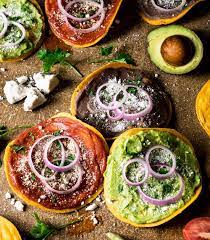
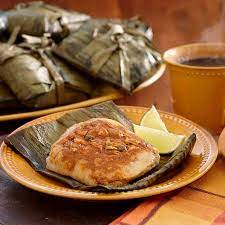

Corn: the heart and soul
At the core of Guatemalan cuisine lies corn, a sacred crop for the Mayan people and a symbol of sustenance. Corn is transformed into the ubiquitous tortillas, which accompany nearly every meal. These thin, round, and freshly made corn flatbreads are the perfect vessel for sopping up the delicious flavors of Guatemalan dishes.
The harmony of beans and rice
Black beans are another essential ingredient in Guatemalan cooking. They are often paired with rice to create a comforting and nutritious staple. Gallo en chicha is a classic example—a dish featuring chicken cooked with aromatic spices and served with a savory-sweet chicha sauce, made from a blend of fruits and spices.
Meats and seafoods
Guatemalan cuisine embraces various types of meat, including chicken, beef, and pork. Seafood takes center stage along the coasts, offering delectable options such as ceviche, where fresh fish is marinated in citrus juices and seasoned with herbs and chilies for a burst of refreshing flavors.
Pepian and recados-flavorful sauces
Pepián and recados are the heart and soul of Guatemalan stews and meat dishes. These flavorful sauces are crafted from a medley of spices, tomatoes, and sometimes a hint of chocolate, adding depth and richness to many traditional recipes.
Tamales
Tamales are a cherished Guatemalan specialty. These bundles of joy are made from corn masa filled with an array of ingredients, including chicken, vegetables, or sweet fillings. Wrapped in banana leaves or corn husks, they are lovingly steamed to perfection.
Spice it up with chiles
For those who savor a touch of heat, Guatemalan cuisine doesn't disappoint. Various types of chiles are used to infuse dishes with a spicy kick, bringing a delightful warmth to the palate.
Sweet temptations
No meal in Guatemala is complete without a sweet ending. From dulce de leche, a luscious caramelized milk confection, to sweet breads, and desserts featuring ingredients like plantains and sweet potatoes, Guatemalan sweets are a delightful indulgence.
Sip and savor
When it comes to beverages, Guatemala is renowned for its coffee. The country produces high-quality coffee beans, making it a coffee lover's paradise. Don't miss the opportunity to sip on a cup of freshly brewed Guatemalan coffee. Additionally, horchata, a refreshing rice-based drink, is a popular choice for quenching your thirst.
Street food delights
Exploring Guatemala's bustling streets reveals a world of street food delights. Tacos, tostadas, and elotes (corn on the cob) are just a few of the mouthwatering options offered by street vendors.
Mayan Heritage
One cannot truly appreciate Guatemalan cuisine without acknowledging the profound Mayan influence. Dishes like Kak'ik, a turkey stew with Mayan roots, connect the present to the ancient traditions that have shaped this culinary landscape.

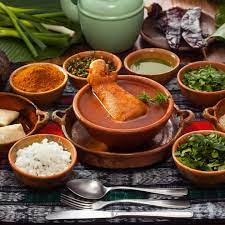

Tostadas Guatemaltecas or Guatemalan tostadas are snacks made with deep-fried or oven-toasted corn tortillas as the base. They’re often served as a quick snack or appetizer, usually before lunch or when celebrating holiday festivities with family. They’re also commonly sold as street food in Guatemala. Tostadas can be topped with various ingredients but traditional Guatemalan tostadas are usually topped with guacamole, tomato salsa, or refried black beans.
Tamales are a traditional Mesoamerican dish that dates back to 8,000 to 5,000 B.C. They’re made with either corn masa or rice flour and steamed in fresh plantain leaves (or corn husks) to give them a rich flavor and aroma. They can be filled with various meats, cheeses, fruits, corn, tomatoes, bell peppers, roasted chilies, or any other ingredient. Guatemala has four main versions of the dish – tamale colorado (red tamales), tamale negro, chuchito, and tamalito.
If each country has its own soup dish that stands to represent its culture and cuisine, Guatemala has Caldo de res. Often called cocido or “cooked” in Antigua, this beef broth is one of the most consumed dishes in Guatemala. As a result, it’s a regular offering on the menus of Guatemalan restaurants and other dining establishments. Its roots can be traced back to a similar dish of Andalucian origin – a peasant soup called puchero that was prepared during colonial times in Latin America and the Philippines. It has taken many names in countries where it’s popular, and Guatemala has its own version of it in the form of Caldo de res.
Jocon is another traditional Guatemalan dish that hails from Huehuetenango, a city and municipality in the country’s western highlands. It’s popular among the Mayan population since the dish itself is heavily influenced by its people. Also known as jocon de pollo, the recipe uses chicken stewed in a green sauce made with cilantro and tomatillos. It’s then thickened with ground pumpkin and sesame seeds and served with corn tortillas, rice, and avocado slices.
Pepian de Indio, is recognized as one of the national dishes of Guatemala. This chicken stew is also said to be the ultimate Guatemalan comfort food. With its tender cuts of chicken cooked in a lightly-spiced tomato sauce and mixed with toasted pumpkin seeds and chili sauce, it’s hard to argue with that. Its origins date to pre-colonial times when the Mayans grew crops such as corn, beans, chilies, squash, and tomatoes, which are the basis of their cuisine. But the key to the delicious nutty flavor of pepian de indio is the pan-roasted pumpkin and sesame seeds that are ground into a fine powder and mixed in the sauce to give it that smooth velvety texture.
Kak’ik is one of the most popular Mayan dishes in Guatemala and is also recognized as one of the country’s dishes of intangible cultural heritage. It’s a type of turkey soup cooked in a lightly spiced red broth. This popular Guatemalan turkey soup is traditionally prepared by using native turkeys, tomatoes, cilantro, chilies, and achiote which gives the soup its vibrant color.
If there’s one dish served during a specific holiday in Guatemala, that would be Fiambre. Widely regarded as a Guatemalan national dish, fiambre is a unique salad prepared and consumed yearly for All Saints Day (Dia de Todos Santos) and the Day of the Dead (Dia de Los Muertos). Fiambre was believed to have started when families tending their dearly departed’s graves would bring food – usually what their loved ones enjoyed when they were still alive – and share a meal. They believe this reignites their connection with them. With Guatemalans known for being warm and friendly, they eventually share what they have with other neighboring families visiting their gravesite, creating fiambre in the process. Fiambre translates to “cold meat” or “cold cuts” in Spanish. It’s an assembly of various ingredients on one big plate and served cold. A fiambre recipe involves an assortment of meats, cheeses, pickled relishes, and vegetables, which totals an average of around forty ingredients, making it worthy of being the mother of all salads.
Mole de platano is a traditional Guatemalan dessert that’s perfect for chocolate lovers. It’s made of mole, a chocolate sauce mixed with fried plantains, cinnamon, chili, and bell peppers sprinkled with sesame seeds. The dish has been deemed so important in the country’s culinary heritage that it was given Intangible Cultural Heritage status in 2007 by the Guatemalan Ministry of Culture and Sport.
Guatemala is considered the birthplace of chocolate. The ancient Mayans worshipped the cacao tree and its beans to the point that they referred to it as the “food of the gods”. Ixcacao was the goddess of chocolate and was often called upon to provide bountiful harvests. During the Mayan era, chocolate was consumed mostly as a bitter and spicy drink. To prepare, they would grind the cacao beans by hand and mix them with water, vanilla, honey, corn, and chili. Typically reserved for the elite, chocolate was regarded as a valuable commodity that was used as an aphrodisiac and a form of currency.
Atol de elote is a sweet and creamy corn drink that’s commonly sold in markets. Served warm and often seasoned with cinnamon or vanilla, atol de elote tastes similar to arroz con leche and could be described as a cross between horchata and corn chowder. Creating the silky-rich texture is traditionally done by grinding corn using a grinding stone or metate. Milk, sugar, and spices are mixed in a giant pot where the sweet concoction is heated before being served in cups.
Guatemalan cuisine is a fusion of flavors and cultures, a reflection of a nation's rich history and diverse geography. Whether you're savoring the simplicity of freshly made tortillas, indulging in the complex flavors of pepián, or exploring the spice-infused world of chiles, every bite in Guatemala tells a story. So, when you visit this beautiful country, don't just travel; embark on a culinary journey that will leave your taste buds tingling with delight and your heart brimming with the warmth of Guatemalan hospitality.
Join our Yoga and Hiking Retreat in Guatemala by clicking here.
